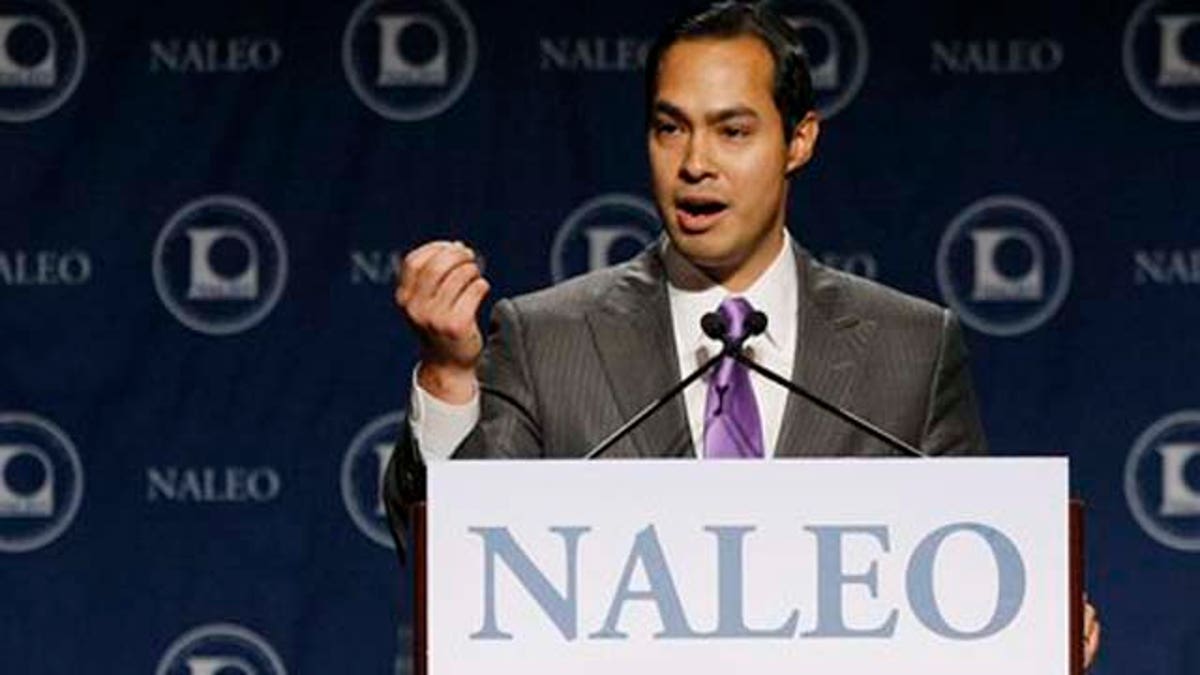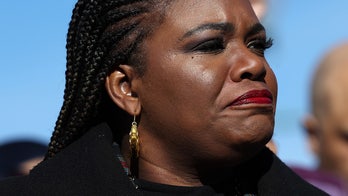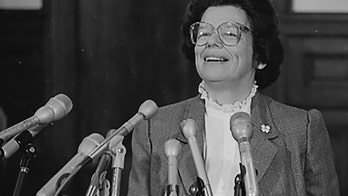
En esta fotografÃa del 23 de junio del 2011, el alcalde de San Antonio Julian Castro habla durante la 28va conferencia anual de la Asociación Nacional de Funcionarios Latinos Electos y Nombrados, o NALEO, en San Antonio. Luego de haberse encumbrado como uno de los polÃticos latinos más prominentes del paÃs, Castro comienza su segundo periodo como alcalde de la séptima ciudad más grande del paÃs con menos consternación por su celebridad y su manera de decir las cosas. (Foto AP/Darren Abate)
San Antonio Mayor Julian Castro is beginning his second term in the national spotlight.
He co-headlined a recent gathering of Hispanic leaders and blasted the immigration agenda of Texas Gov. Rick Perry and Republicans as the most "anti-Latino" in a generation.
Shortly after, the event's other headliner took the stage: Perry himself.
"That was me basically saying, `Look, you're not going to do all these things and act as though everything's fine,"' said Castro, a Democrat, days after his June address to the National Association of Latino and Elected Appointed Officials.
Having already climbed among the country's most prominent Latino politicians, the 36-year-old Castro is starting his second term as mayor of the nation's seventh-largest city more at ease with both his celebrity and speaking out. His NALEO appearance railed against Perry-backed efforts to target so-called "sanctuary cities" of illegal immigrants and GOP lawmakers prioritizing new voter ID laws, and was a possible glimpse of speeches to come if Perry enters the race for president.
Since taking office in June 2009, Castro has made more than a dozen trips to Washington. Not all have been for meetings with President Barack Obama's administration, but the third-year mayor has nonetheless talked immigration and energy policy in the White House, alongside other invites such as former California Gov. Arnold Schwarzenegger and New York Mayor Michael Bloomberg.
Castro backed Obama's fiscal policy speech in April and joined a presidential delegation to Mexico City. First lady Michelle Obama even lauded Castro and fitness initiatives in San Antonio -- despite about two-thirds of the city being obese or overweight, which ranks the area among the nation's fattest.
The exposure has driven speculation about Castro's political future; the governor's mansion, Congress or a cabinet-level post swirling as the usual rumors. In San Antonio, a mayor can serve four two-year terms.
Castro said he's likely not going anywhere until 2017.
"This was a job I really did look forward to growing up, when I thought about politics," Castro said. "So I'm not in a hurry to leave."
His identical twin brother, on the other hand, is already making his next move. Texas state Rep. Joaquin Castro will challenge nine-term Democratic U.S. Rep. Lloyd Doggett in 2012 for his congressional seat, which the Republican-controlled Texas Legislature redrew this past session.
The newly created 35th district is largely Hispanic, stretches from Austin and San Antonio, and includes the neighborhood where Julian and Joaquin were raised by their mother, who was a prominent Latino-rights activist in the 1960s and 1970s.
Joaquin Castro said he wouldn't have entered the race unless the district had been drawn, adding that he wasn't just looking to run in 2012.
San Antonio is 63 percent Hispanic, and demographers consider the city a preview of what Texas will look like in the near future. Census numbers released in February showed that Hispanics have accounted for two-thirds of the state's growth since 2000, and now comprise more than 38 percent of the state's population.
That growth, however, has not translated into success for Democrats, who hold no statewide offices in Texas and were outnumbered by a GOP supermajority in the House this past session.
Aside from being content with being mayor, Castro concedes that the red climate of Texas isn't hospitable for a Democrat to make a statewide run. But he believes the wide gains Republicans have made will begin reversing following the immigration policies pursued by lawmakers in the last session.
One bill, the so-called "sanctuary cities" measure, would have given police more power to ask anyone they detain about their citizenship status. Hispanic groups compared it to Arizona's controversial immigration law, and the San Antonio City Council passed a resolution last year asking lawmakers not to pursue a similar measure. Castro said it remains the only resolution he's adopted as mayor.
Castro said he knows there is a challenge, however, of getting more Hispanics to vote.
"We have to acknowledge that some of these policies could have been prevented if we would go out in greater numbers," Castro said. "We have to take responsibility for getting off the couch and voting."
Castro describes his relationship with the White House as "warm," adding the administration has simply recognized that initiatives in San Antonio fit with its own agenda. Last month Castro arguably made his biggest news yet as mayor, announcing that a coal-fired power plant that's brought electricity to San Antonio since the 1970s will be the first in Texas to shut down as part of the city's green energy efforts.
Henry Flores, a professor of political science at St. Mary's University in San Antonio who has closely followed Castro's career, said there's more to the Obama administration taking a shine to Castro than his priorities for the city.
"(Obama) put together kind of newer, younger constituencies in the African American and Latino communities. He moved away from the traditional leadership. You didn't see any of the traditional leaders. You saw some younger 30-somethings," Flores said. "I think he's referencing Mayor Castro as part of that strategy."
Castro is busy with usual city business in the meantime. Take last Tuesday, when he started his day speaking at an energy conference, then to a meeting of Internal Revenue Service workers, followed by a press conference for a local microlender. He finished with a press conference on city efforts to curb the use of plastic grocery bags, then spoke to a room of at-risk children at a counseling center.
"When you do a good job in your role, there are other opportunities that will come along," brother Joaquin Castro said. "And who knows what those opportunities will be."
This is based on a story by The Associated Press.
Follow us on twitter.com/foxnewslatino
Like us at facebook.com/foxnewslatino




